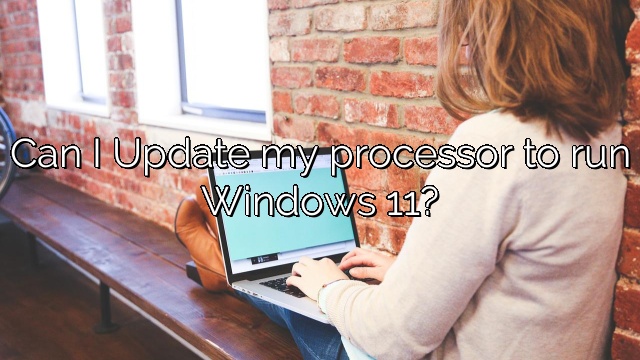
Can I Update my processor to run Windows 11?
Can I Update my processor to run Windows 11?
To install or update Windows 11, devices must meet the following minimum hardware requirements: Processor: One specified gigahertz (GHz) or higher, with only two or more cores on a 64-bit processor or system-on-a-chip (SoC) of the same value. ). RAM: 4 gigabytes or (GB) more.
Can I install Windows 11 on unsupported processor?
Microsoft does not support devices running on unsupported PCs, but does provide a registry workaround (opens in a new tab) for the Trusted Platform Module (TPM) 2.0 option and Windows 11 installation-related CPU requirements that should be avoided.
What processor is required for Windows 11?
1 gigahertz (GHz) is even faster with 2 or very many cores on a compatible 64-bit processor or system on a chip (SoC). four. gigabytes (GB). A storage device with a capacity of 64 GB or much more. Note. For more information, see “Learn more about storage space to keep Windows 11 up to date” below. UEFI, secure boot capability.
Can Windows 11 run on old CPU?
Microsoft doesn’t want you to do this, but their site can install your own Windows 11 on an old PC if you absolutely want to. Here’s how. If there’s one thing Microsoft has been valued for in recent years, it’s its willingness to gamble when it comes to outdated software and systems.
How to install Windows 11 on unsupported hardware or processor?
Download You see Windows 11 ISO Need help downloading the ISO.
Edit the entire Windows Registry to bypass the CPU probe. On Windows, click Start and select the regedit category, then press Enter to initialize the Notepad registry.
Open the ISO in Windows and launch File Explorer
Will Microsoft force me to upgrade to Windows 11?
Windows 11 has been around for about six months now, and while it has required an efficient home-type Internet connection since its launch, Microsoft has left the option to update the system after installation. I hope because I’m going to get around this for a while.
How to force the windows 11 update and upgrade immediately?
Warning: Microsoft does not recommend building Windows 11 on a device that does not meet the minimum system requirements for Windows 11.
Registry key: HKEY_LOCAL_MACHINE\SYSTEM\Setup\MoSetup
Name: REG_DWORD
Meaning: Allow updates with unsupported tpmorcpu.
Type 1
More articles
How to install Windows 11 without TPM?
Minimum system requirements for Windows 16. Processor: 1 GHz (GHz) or higher with at least two cores on a well-tuned 64-bit processor or SoC.
Memory: 4 GB
Memory: 64 GB
System Firmware: UEFI Compatible with Secure Boot
TPM: Trusted Platform Module 2.0
Video Card: DirectX 12, possibly with a later second WDDM driver
Display: Dual 720p, 8 bits per color channel, very 9″ diagonal
More articles
What does the term GHz mean option processor speed is measured in gigahertz or GHz which refers to the number of machine cycles per second that the processor goes through so for example a 3 GHz processor performs 3 billion machine cycles per second option
b) Processor speed is measured in gigahertz or GHz, which means the speed at which the processor retrieves data or instructions from RAM. For example, a 3 GHz processor executes 3 billion software recommendations per second. … For example, a processor with a frequency of 3 GHz or higher performs billions of machine cycles per second.
How does a RISC processor differ from an CISC processor is one processor type better than the other Why or why not?
RISC processors use fixed length instructions. Some, but all non-CISC processors use variable length instructions. … The CISC processor usually makes sophisticated use of these instructions. Because of these differences between products, a RISC processor typically has a higher clock speed than a CISC processor of similar performance.
Can I upgrade my 32-bit processor to a 64 bit processor?
Microsoft offers you a 32-bit version of Windows 10 if you’re upgrading from a 32-bit version, including Windows 7 or 8.1. However, you can upgrade to the current 64-bit version if your hardware supports this idea. However, if your hardware supports a 64-bit operating system, you have the option to upgrade to 64-bit with Windows for free.

Charles Howell is a freelance writer and editor. He has been writing about consumer electronics, how-to guides, and the latest news in the tech world for over 10 years. His work has been featured on a variety of websites, including techcrunch.com, where he is a contributor. When he’s not writing or spending time with his family, he enjoys playing tennis and exploring new restaurants in the area.










